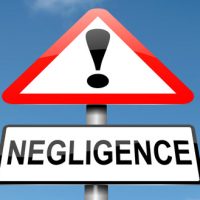What is “Duty” In a Negligence Case?

When people look at and analyze a negligence case, they often ask, “what did the Defendant do wrong?” That’s a valid question, but legally, the analysis of whether someone is liable for an accident is more complex than that.
To prove negligence, the victim needs to show four, basic elements: duty, breach, causation and damages. Each must be present, and each is a gatekeeper; that is, if you don’t have any one, you don’t move on to the next, and the Defendant cannot be held legally negligent.
Proving Duty
The first element, duty, is often the easiest to prove, but also, the one that is hardest to understand.
Duty asks whether the Defendant (the negligent party) had any duty of care to the victim. That is, is the victim someone that the Defendant had to protect, or someone who could be injured by the Defendant’s actions or omissions?
Zone of RIsk and Foreseeability
In analyzing duty, we look at foreseeability, and ask, “if the Defendant were negligent, is the victim someone that could foreseeably be injured by the Defendant’s actions?” Because of this inquiry, victims who are injured, but whose injury is just “too far away from” the negligence, cannot get recovery for their actions.
Examples of Duty
Often, duty is easy. Any professional, like a doctor or a nursing home, owes you a duty of care. Any store or person that invites you in their home, owes you a duty of care. Any person that operates a vehicle, owes other drivers and pedestrians a duty of care. These are easier cases to prove (when it comes to duty).
But imagine scenarios where the injury is farther away from the actions of the Defendant.
For example, imagine that the Defendant gets into a car accident. In the other car, is a doctor on his way to surgery. Because the doctor cannot make it to surgery, the surgery patient dies. Can the patient’s family sue the negligent driver?
Certainly, we all owe a duty of care to everybody on the road. But do we owe a duty to everybody else who may be affected by the car accident, such as the surgery patient? Likely not.
Imagine that the power goes out, and you fall, injuring yourself. Can you sue the power company for your injuries? Maybe not; providing power does not create a duty to protect every single person who may rely on that power, or who may be injured when it goes out.
Creating Duty
Duty can be created, where it doesn’t otherwise exist. So, someone who provides a lifeguard, or a babysitter, or a security guard, can be liable for those individual’s errors and omissions, even if there was no duty to protect people in the first place. In other words, there was no duty to do anything—but once the Defendant did something (like provide security or a lifeguard), they created a duty to do that with reasonable care.
Let our negligence lawyers help you. Call our Boston personal injury lawyers at The Law Office of Joseph Linnehan, Jr. today at 617-275-4200 if a loved one has been injured in any kind of accident.
Source:
jec.unm.edu/education/online-training/torts-tutorial/duty-of-care-intent-or-negligence
